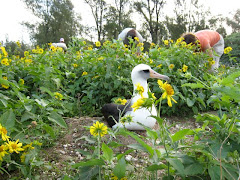Welcome to the PAA Blog
Papahānaumokuākea 'Ahahui Alaka'i (PAA) is a ten-day experiential leadership program that brings together teachers, business people, policy-makers as well as potential community leaders interested in learning and being inspired by science and traditional knowledge management practices. Papahānaumokuākea Marine National Monument encompasses roughly 140,000 square miles of the Pacific Ocean, an area larger than all the country's national parks combined. The area around the Northwestern Hawaiian Islands is an important safe haven for wildlife such as the threatened green turtle and the endangered Hawaiian monk seal. ‘Ahahu‘i refers to society, club or association. Alaka’i is Hawaiian for ambassador or leader. The Hawaiian word /acronym PA‘A means steadfast, learned, determined, strong, to hold, keep, retain.
Monday, June 8, 2009
Introductions: Carlie Wiener
Teaching daily about the Monument, I am aware that these islands represent a culmination of sciences, culture and conservation making a globally unique area. Through participation in this program, I hope to be able to continue to improve my abilities to carryout one the mission of bringing the place to the people. By working with a new group and gathering inspiration and experience from visiting Midway, I will be able to translate this to the public in the form of community programs, targeting local students to take interest in their Kupuna Islands and marine conservation. I also hope that I will personally be able to grow my depth and understanding of this special place by spending some time with new people from different places. Developing fresh ideas and forming new relationships is also important to me.
Upon my arrival back to Oahu I would like to incorporate my trip experience into my outreach programs. Working with the local communities and school groups, I hope to teach about marine science and conservation using these trips lessons, photographs and new activities developed. I would like to focus on using intergenerational learning to reach both parents and their children at the same time. The most important message for me is that the public understand that the marine impacts in the main islands can affect the entire Archipelago. A focus on hands-on activities highlighting important biological and ecosystem function aspect of the Monument will also used. I am also a large advocate of using interdisciplinary learning using a combination of arts and sciences in my programs. Not only would I like to work with the local community, I am interested in bringing ocean conservation messages and information about the Monument into classrooms where students do not have direct access to the ocean. This is important because it demonstrates the Monument as a global treasure.. Those who do not have ocean access often lack an understanding that their actions can have direct impacts on our marine environments.
Upon my arrival back to Oahu I would like to incorporate my trip experience into my outreach programs. Working with the local communities and school groups, I hope to teach about marine science and conservation using these trips lessons, photographs and new activities developed. I would like to focus on using intergenerational learning to reach both parents and their children at the same time. The most important message for me is that the public understand that the marine impacts in the main islands can affect the entire Archipelago. A focus on hands-on activities highlighting important biological and ecosystem function aspect of the Monument will also used. I am also a large advocate of using interdisciplinary learning using a combination of arts and sciences in my programs. Not only would I like to work with the local community, I am interested in bringing ocean conservation messages and information about the Monument into classrooms where students do not have direct access to the ocean. This is important because it demonstrates the Monument as a global treasure.. Those who do not have ocean access often lack an understanding that their actions can have direct impacts on our marine environments.
Subscribe to:
Post Comments (Atom)

















No comments:
Post a Comment